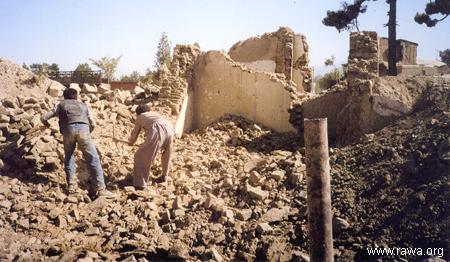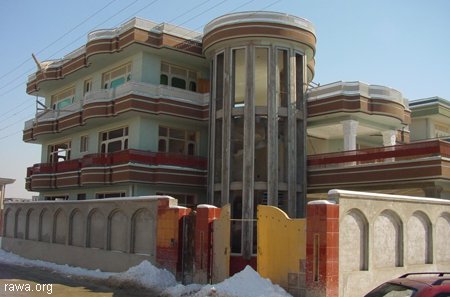Post-Taliban Kabul blossoms for the rich
"The Taliban time was very bad and now it is very bad for the poor. Where is the difference?"
By Kathy Gannon, Associated Press WriterKABUL, Afghanistan --Eight-year-old Sajjad's kite struggles upward. It's nothing grand -- a plastic bag salvaged from a heap of garbage and fashioned into a diamond shape.
But it's a symbol of change in Kabul, five years after the Afghan capital was freed from a Taliban regime that believed activities such as kite-flying would distract youngsters from studying the Islamic holy book, the Quran.
The U.S.-led war and the Western-friendly government that followed eliminated that rule and a host of others. Girls have returned to school. Public beheadings and amputations as punishment for crimes came to an end.
The times have changed. But in Kabul today the question often asked is: How much and for whom?
Sajjad (he says he has no last name) lives in a neighborhood called Shirpur, a significant symbol of what has changed since U.S. and British bombs drove the Taliban from the city on the night of Nov. 12-13, 2001.
Part of it has been demolished and its inhabitants evicted to make way for a "new Afghanistan" of palatial homes -- scores of four- and five-story mansions boasting gold-painted marble columns and floor-to-ceiling windows flanking grand wooden doors.
The owners are the successors to the Taliban -- movers and shakers who in 2003 used their new power to seize and clear the land. About 250 of Sajjad's neighbors were tossed from their homes.
Miloon Kothari, the UN's housing representative, complained and Afghan President Hamid Karzai promised to investigate, but nothing has come of it.
Now, in the waning days of October 2006, Sajjad runs past a half dozen goats and a cow feasting on rotting garbage to get his flimsy kite airborne. He lives with seven brothers and four sisters in a single-story house of dried mud, straw and pebbles. He wears cracked plastic sandals and a torn brown shirt with only three buttons remaining.
One of his neighbors, Aziz Mohammed, a potbellied man with a speckled beard, stands ankle deep in the mud he is using to winterize his home of 25 years.
Mohammed says he has been told that his and his neighbors' houses will be flattened soon to make way for more mansions.
The owners of these mansions "are commanders, ministers. It makes me angry. These people use everything that isn't theirs and they ruin the houses of the poor people to build their homes," said Mohammed. "The Taliban were no good, they were just stupid people. But in this new life there is no job, nothing."
The man who ordered the first homes razed in 2003 was Kabul Police Chief Abdul Bassir Salangi. He has two houses in the ostentatious subdivision. Salangi has since been appointed police chief of eastern Nangarhar province and could not be reached for comment.
The big question, said Najibullah Siddique, director of the Afghan charity Afghans for Tomorrow, is why the billions of dollars in foreign aid that has poured into Afghanistan isn't making a difference. "Why doesn't the government help the poor? Why do the government people and commanders build big mansions and poor people still live in bad conditions?"
Gul Haider, a commander of the Northern Alliance that swept into Kabul after the Taliban's collapse, makes no apology for owning a mansion in Shirpur.
"This is the new Afghanistan. We are just beginning. All these houses are from the private pockets of Afghans and I hope one day that all of Afghanistan will be beautiful like Shirpur," he said in an interview.
"We are praying for the poor people to have houses like us," he said. "But everything belongs to God. God knows better who should be given property and who shouldn't. God gave us this property and we built our houses. We are praying that God will look more favorably on the poor."
In the months following the Taliban's collapse there were signs of a business renaissance. Barbershops, beauty salons and music stores reopened. Afghan exiles returned to start businesses.
But many have since been driven out by runaway corruption, lawlessness and the violence perpetrated by a resurgent Taliban, highlighted by a string of recent suicide bombings in Kabul.
Post-2001 Afghanistan has an elected parliament but it is criticized for its inclusion of warlords, commanders and mujahedeen leaders.
Last May, an outspoken lawmaker, Malalai Joya, attacked the warlords and rebel commanders in the chamber for their role in the civil conflict that destroyed Kabul and killed 50,000 civilians when they were in power between 1992 and 1996, a period of anarchy that gave rise to the Taliban. The response from the floor was threats of rape and death.
A recent report by Womankind Worldwide, a British-based advocacy group, challenges the notion that Afghan women are better off now.
It said the scenes in 2001 of women throwing off their all-covering robes were misleading, and that except for a small elite in Kabul, women still have to cover their entire bodies.
It said up to 80 percent of all Afghan marriages are forced, 57 percent of girls are married off before age 16, some as young as 6, "and the number of women setting fire to themselves because they cannot bear their lives is rising dramatically."
While girls are back at school, the program is far short of where it should be, says Siddique.
"Girls education is like a car," he said. "During the Taliban there was no gas and the car didn't work. Now we are putting in gas and it is running but it isn't because of this government. Any government after the Taliban would have had girls education. But what guarantees do we have? Corruption in the government has delayed schools being built."
Meanwhile, schools are being destroyed, some by the Taliban but as many by tribal feuds, village animosities, and anger at the government for perceived injustices and corrupt practices, he said.
Kabul traffic is a nightmare, a huge contrast from the Taliban era, when only bicycles, yellow taxis and Taliban pickup trucks were running. Luxury SUVs, many driven by the 2,000 employees of the UN and aid agencies, remind the desperately poor how they have been left behind.
Mohammed Habib, an out-of-work laborer, carried his 1-year-old son Mujtaba as he walked the streets begging for food. He said the infusion of foreign aid hasn't changed his life.
"Money comes to help the poor people but the commanders and the government people take it," he said. With the Taliban gone "we thought our future will be better, but every day we are poorer."
Habib might not have noticed, but the culinary landscape of Kabul has changed.
In Taliban times, eating out meant roadside food stalls and rice and kebab restaurants. Now there are restaurants offering French, Italian, Lebanese, German, and Indian cuisine -- but at prices out of the reach of most Afghans.
Alcohol, banned by the Taliban and still offensive to most Afghans, is served, although more discreetly now than in the first post-Taliban years. The government is cracking down by banning the sale of booze at the duty-free stores frequented by foreigners.
Visitors can spend up to $500 a night to stay in the new Landmark Suites hotel, which has a shopping mall and the country's first escalator.
Afghans flocked to the complex and its glass-enclosed shops when it opened, though many couldn't afford the prices.
Hajji Sadiqullah says he is two months behind on the monthly rent of $1,500 for his cosmetics and hair supplies store. "Another month like this and I will die," he said.
In contrast to the Landmark Suites, the Allauddin Orphanage with its hundreds of poor children has a new coat of paint, a few computers, a ration of food from the government and electricity most of the day. But in winter heat still comes from wood stoves, one for each room where nine or more children sleep. And elsewhere in Kabul there is electricity for barely three hours on most days.
Corruption is so rampant that it can take a $50 bribe just to get the tax collector to register payment of your taxes.
On a street corner, a traffic policeman sidles up to a car window, palm out for money. On a small side street, five women in burqas hold out their babies to passing cars, begging food.
Habib, the laborer, looks at the new mansions in Shirpur and sees injustice.
"These people are very bad people. That money was for us and they took it," he said. "The Taliban time was very bad and now it is very bad for the poor. Where is the difference?"
------
Amir Shah, an Associated Press correspondent in Kabul, contributed to this report.
[RAWA Homepage] [More reports from Afghanistan] [RAWA Photo Gallery]
http://www.rawa.org

